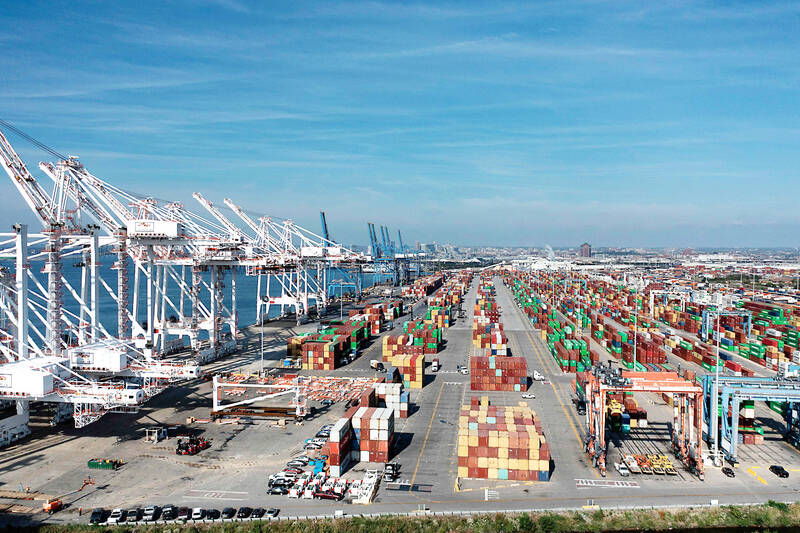US president-elect Donald Trump on Monday said he intends to impose sweeping tariffs on goods from Mexico, Canada and China, prompting a swift warning from Beijing that “no one will win a trade war.”
In a series of posts on Truth Social, Trump vowed to hit some of the US’ largest trading partners with duties on all goods entering the country.
“On January 20th, as one of my many first Executive Orders, I will sign all necessary documents to charge Mexico and Canada a 25 percent tariff on ALL products coming into the United States,” he wrote.

Photo: AFP
In another post, Trump said he would also be slapping China with a 10 percent tariff, “above any additional Tariffs,” in response to what he said was its failure to tackle fentanyl smuggling.
Stock markets in Asia fell yesterday, while the dollar surged about 1 percent against its Canadian equivalent and Mexico’s peso as well as the Chinese yuan after Trump’s tariff remarks.
China and Canada issued swift responses, each calling their trade relationships with the US “mutually beneficial.”
“No one will win a trade war,” Liu Pengyu (劉鵬宇), a spokesman for China’s embassy in the US, told reporters by e-mail, defending Beijing’s efforts to curb fentanyl smuggling.
“China believes that China-US economic and trade cooperation is mutually beneficial in nature,” Liu added.
Canada said that it was “essential” to US energy supplies and that the relationship benefits American workers.
“We will of course continue to discuss these issues with the incoming administration,” Canadian Deputy Prime Minister Chrystia Freeland said in a statement.
Trump’s first term in the White House was marked by an aggressive trade agenda that also targeted China, Mexico and Canada, as well as Europe.
“Mexico and Canada remain heavily dependent on the US market, so their ability to walk away from president-elect Trump’s threats remains limited,” Asia Society Policy Institute vice president and former US trade official Wendy Cutler told reporters.
By citing the fentanyl crisis and illegal immigration, Trump appeared to be using national security concerns as a means to break that deal, something that is usually allowed under the rules set by the WTO or in trade deals.
Many economists have warned that tariffs would hurt growth and push up inflation, as they are primarily paid by importers bringing the goods into the US, who often pass those costs on to consumers.
Those in Trump’s inner circle have said that the tariffs are a useful bargaining chip for the US to push its trading partners to agree to more favorable terms and to bring back manufacturing jobs from overseas.
Trump has said he would put his commerce secretary designate, Howard Lutnick, in charge of trade policy.
Lutnick has expressed support for a tariff level of 60 percent on Chinese goods alongside a 10 percent tariff on all other imports.
William Reinsch, senior adviser at the Center for Strategic and International Studies, said that the move was classic Trump: “Threaten and then negotiate.”
“In terms of what might actually happen, I’d bet on some China tariffs going into effect. That’s legally easier and politically more palatable,” he said. “On Canada and Mexico there was going to be a renegotiation of their trade deal anyway in 2026.”

Sweeping policy changes under US Secretary of Health and Human Services Robert F. Kennedy Jr are having a chilling effect on vaccine makers as anti-vaccine rhetoric has turned into concrete changes in inoculation schedules and recommendations, investors and executives said. The administration of US President Donald Trump has in the past year upended vaccine recommendations, with the country last month ending its longstanding guidance that all children receive inoculations against flu, hepatitis A and other diseases. The unprecedented changes have led to diminished vaccine usage, hurt the investment case for some biotechs, and created a drag that would likely dent revenues and

Global semiconductor stocks advanced yesterday, as comments by Nvidia Corp chief executive officer Jensen Huang (黃仁勳) at Davos, Switzerland, helped reinforce investor enthusiasm for artificial intelligence (AI). Samsung Electronics Co gained as much as 5 percent to an all-time high, helping drive South Korea’s benchmark KOSPI above 5,000 for the first time. That came after the Philadelphia Semiconductor Index rose more than 3 percent to a fresh record on Wednesday, with a boost from Nvidia. The gains came amid broad risk-on trade after US President Donald Trump withdrew his threat of tariffs on some European nations over backing for Greenland. Huang further

CULPRITS: Factors that affected the slip included falling global crude oil prices, wait-and-see consumer attitudes due to US tariffs and a different Lunar New Year holiday schedule Taiwan’s retail sales ended a nine-year growth streak last year, slipping 0.2 percent from a year earlier as uncertainty over US tariff policies affected demand for durable goods, data released on Friday by the Ministry of Economic Affairs showed. Last year’s retail sales totaled NT$4.84 trillion (US$153.27 billion), down about NT$9.5 billion, or 0.2 percent, from 2024. Despite the decline, the figure was still the second-highest annual sales total on record. Ministry statistics department deputy head Chen Yu-fang (陳玉芳) said sales of cars, motorcycles and related products, which accounted for 17.4 percent of total retail rales last year, fell NT$68.1 billion, or

MediaTek Inc (聯發科) shares yesterday notched their best two-day rally on record, as investors flock to the Taiwanese chip designer on excitement over its tie-up with Google. The Taipei-listed stock jumped 8.59 percent, capping a two-session surge of 19 percent and closing at a fresh all-time high of NT$1,770. That extended a two-month rally on growing awareness of MediaTek’s work on Google’s tensor processing units (TPUs), which are chips used in artificial intelligence (AI) applications. It also highlights how fund managers faced with single-stock limits on their holding of market titan Taiwan Semiconductor Manufacturing Co (TSMC, 台積電) are diversifying into other AI-related firms.